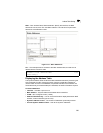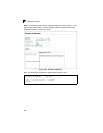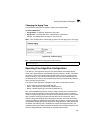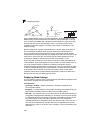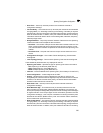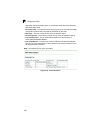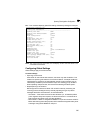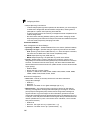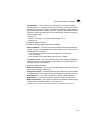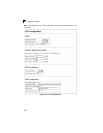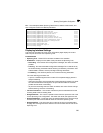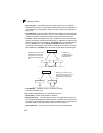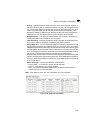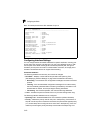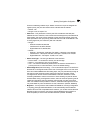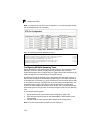
Spanning Tree Algorithm Configuration
3-97
3
• Forward Delay – The maximum time (in seconds) this device will wait before
changing states (i.e., discarding to learning to forwarding). This delay is required
because every device must receive information about topology changes before it
starts to forward frames. In addition, each port needs time to listen for conflicting
information that would make it return to a discarding state; otherwise, temporary
data loops might result.
• Default: 15
• Minimum: The higher of 4 or [(Max. Message Age / 2) + 1]
• Maximum: 30
Configuration Settings for RSTP
The following attributes apply to both RSTP and MSTP:
• Path Cost Method – The path cost is used to determine the best path between
devices. The path cost method is used to determine the range of values that can
be assigned to each interface.
• Long: Specifies 32-bit based values that range from 1-200,000,000.
(This is the default.)
• Short: Specifies 16-bit based values that range from 1-65535.
• Transmission Limit – The maximum transmission rate for BPDUs is specified by
setting the minimum interval between the transmission of consecutive protocol
messages. (Range: 1-10; Default: 3)
Configuration Settings for MSTP
• Max Instance Numbers – The maximum number of MSTP instances to which this
switch can be assigned. (Default: 65)
• Configuration Digest – An MD5 signature key that contains the VLAN ID to MST
ID mapping table. In other words, this key is a mapping of all VLANs to the CIST.
• Region Revision* – The revision for this MSTI. (Range: 0-65535; Default: 0)
• Region Name* – The name for this MSTI. (Maximum length: 32 characters)
• Maximum Hop Count – The maximum number of hops allowed in the MST region
before a BPDU is discarded. (Range: 1-40; Default: 20)
* The MST name and revision number are both required to uniquely identify an MST region.



